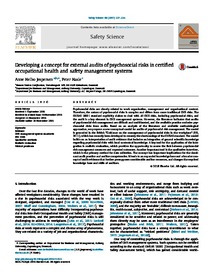Developing a concept for external audits of psychosocial risks in certified occupational health and safety management systems

Jespersen, Anne Helbo ; Hasle, Peter
2017
99
Part B
November
227-234
psychosocial risks ; OSH management system ; auditing
Psychosocial risks
https://doi.org/10.1016/j.ssci.2016.11.023
English
Bibliogr.;Charts
"Psychosocial risks are closely related to work organization, management and organizational context. Therefore, the nature of psychosocial risks is complex and differs from more traditional OHS risks. The OHSAS 18001 standard explicitly claims to deal with all OHS risks, including psychosocial risks, and the audit is a key element in OHS management systems. However, the literature indicates that audits of psychosocial risk management are difficult and multifaceted, and the available practice excludes psychosocial risks from audits. Based on an analysis of the literature and available methodological approaches, we propose a new conceptual model for audits of psychosocial risk management. The model is grounded in the British “Guidance on the management of psychosocial risks in the workplace” (BSI, 2011), which has recently been developed to remedy the shortcomings of the OHSAS standard. The model builds on an interpretation of audit evidence that includes an integration of general scientific knowledge regarding psychosocial risks with local contextual knowledge. A key tool for the application of the integration is realistic evaluation, which provides the opportunity to assess the link between psychosocial risk management measures and expected outcomes. Another important tool is the qualitative interview, which is the primary method for data collection. The concept has important implications for the dominant audit practice and auditor competencies. It leads to an expanded knowledge base and a broader concept of audit evidence that further presupposes considerable auditor resources, and changes the required knowledge base and skills of auditors."
Digital
The ETUI is co-funded by the European Union. Views and opinions expressed are however those of the author(s) only and do not necessarily reflect those of the European Union or the ETUI.